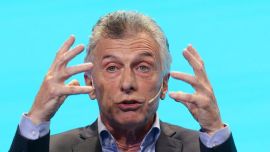Like the protagonist of a science fiction film.
That’s what Editorial Perfil employee Miguel Sette felt when he entered the City’s Military Hospital last Monday as a volunteer to receive the first dose of vaccine against coronavirus, manufactured in Argentina by Pfizer laboratory and developed in Germany by BionTech.
“It seemed like one of those classic sci-fi films in which the hero has to pass through various controls before reaching the test lab,” Miguel told Perfil. “All the military staff wore their combat uniforms of khaki camouflage while the doctors and nurses were covered from head to foot with protective equipment, including face shields.”
Sette is one of the 4,500 volunteers who have responded to the call of the Argentine lab to join the tests being carried out since August 10 in a bid to find the antidote to coronavirus. The volunteers for the studies in Brazil also total 4,500 while 25,000 are participating in the United States.
Regarding his decision to participate in the tests, Sette assured that it “was a way of helping” in the battle against the coronavirus pandemic.
“My family was in agreement,” stressed the resident of Lanús.
Sette, 42, described that prior to the vaccination, a female scientific researcher explained to him step by step the test to which he would be submitted.
“I signed a 29-page contract which explained to me every step of the study and they asked me if I would agree to donate blood for further studies in the United States.”
Contract in hand and with a file of various forms which would be completed as the test unfolded, Miguel began to “live his experience” as a volunteer. After the compulsory nasal swab and blood sampling, the moment of truth arrived – the actual vaccination.
“They took me to a booth where I awaited the nurse for the jab. In reality it was just like the flu vaccine. I didn’t feel a thing and it just lasted a few seconds. But I still had to wait there another half an hour since every 10 minutes a doctor entered to take my temperature and to see if I had any type of reaction or symptom,” tells Miguel about his experience.
Immediately afterwards, he was given a set with a thermometer, alcohol-based hand gel and a mobile telephone in order to register how he felt, as from a week of the inoculation.
As to any ill effects, “the other day on Tuesday I felt a bit tired physically and very sleepy. Those were the only symptoms beyond the normal,” he says. “Afterwards I continued my normal life without problems as if nothing had happened.”
The next phase of the test will be on September 7 when he must receive the second dose of the vaccine.
“I already have my appointment assigned. Afterwards I’ll have controls six, 12 and 24 months from the first dose,” he explains.





















Comments